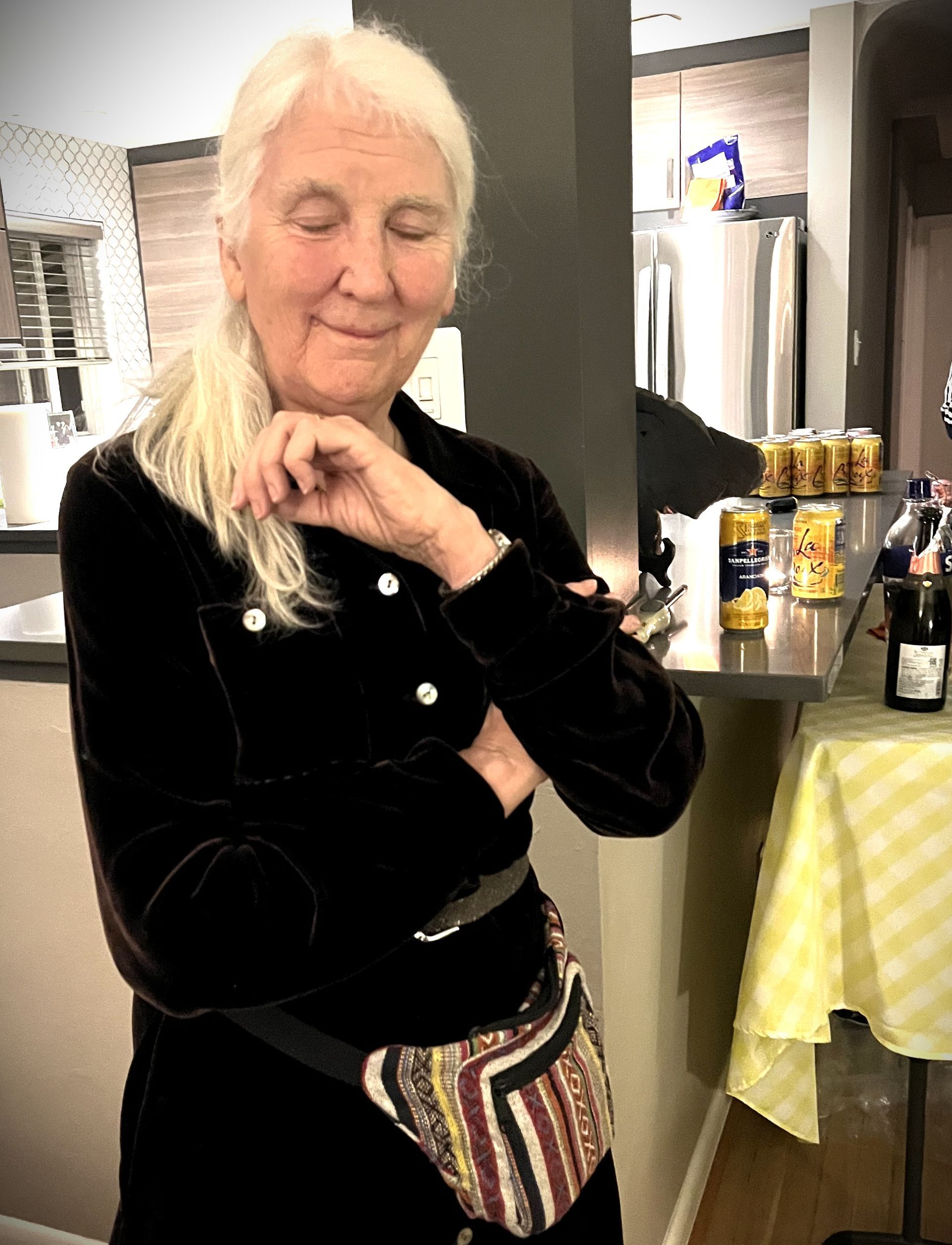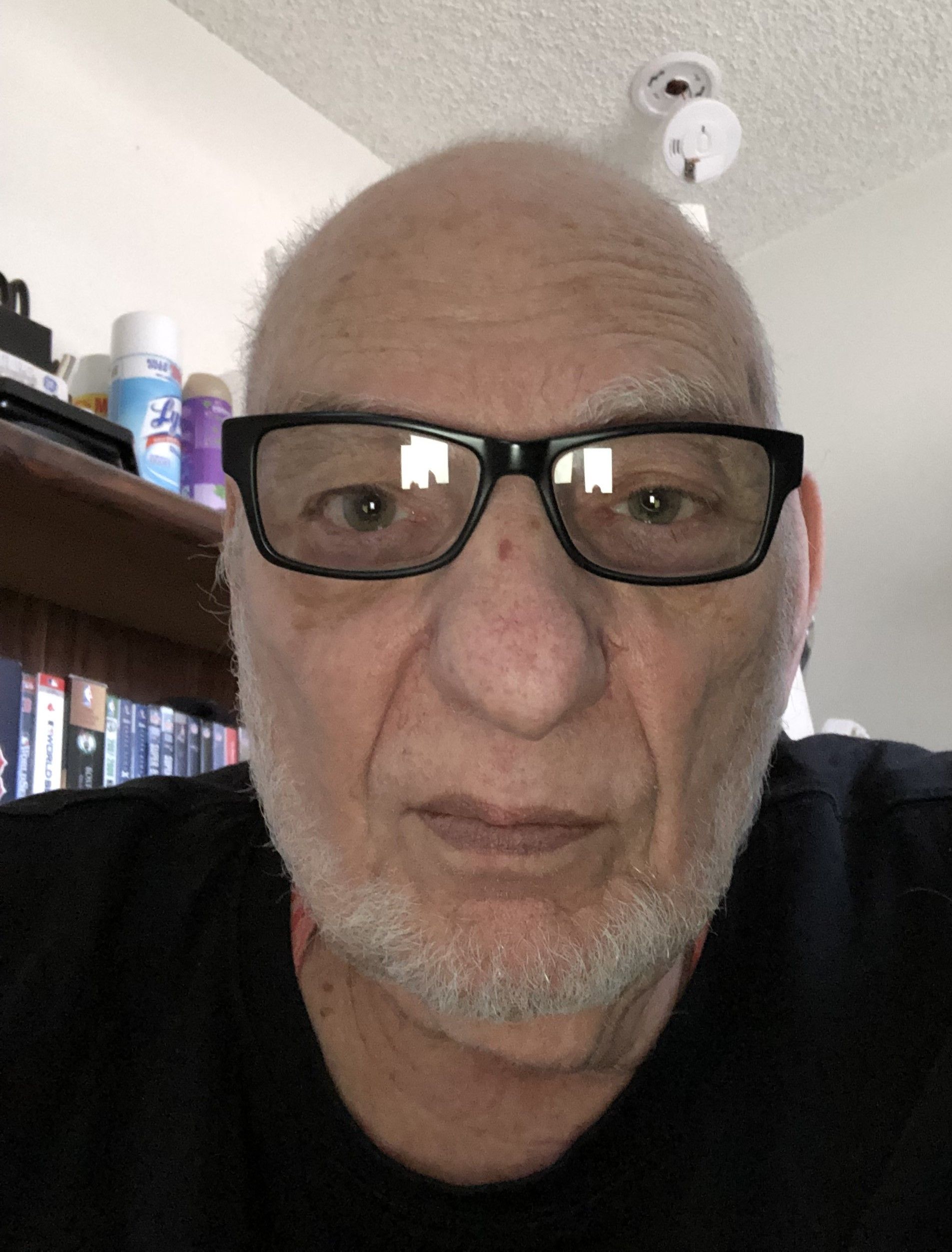Thursday's Columns
February 20, 2025
Our
Story
by
Lawrence Abby Gauthier
ace reporter
The Westphalia Periodic News

Culley Jane at a Holiday Party last month.
Somebody's Valentine
Instead of getting Culley Jane heart-shaped chocolates for Valentine’s Day, I decided to write about her and us. Something simple, like the Be My Valentine cards we passed around at school as kids.
We’re still newlyweds, Culley Jane and I. Next September (I think) will be three years, five years since we first met. We met on a dating site shortly after I retired in 2019.
I don’t want to make this gushy. Love in your 70s is not the same as teenage love in the back seat of the ol’ man’s Chevy. It’s probably better than I remember.
Quantum algorithms had concluded that our dating site profiles matched. Same age (I’m two months older). Same location (a Denver suburb). We both said that we were writers.
Our first date was a walk in Cherry Creek State Park. She was in better shape than me. But I said I had Silver Sneakers with my Medicare supplemental so I could go to any gym with a swimming pool for free, which she said sounded like a good idea. I had just spent 20 years living the life of an over-the-road trucker and obviously needed a new body.
As an old practiced newspaper reporter, and extrovert, I can learn a lot about somebody in a short amount of time — who, what, when, where and why?
She grew up in a neighborhood in the Pacific Northwest in a family that valued books and knowledge. They didn't have a television. Her parents and two older brothers would sit in surrounding chairs in the living room at night studiously reading books. They memorized and recited poetry. She heard about Howdy Doody from other kids at school, but never saw the show.
She grew up in an academic culture. Her father was a professor at Oregon State University in Corvallis, where they lived. The fathers of her best childhood friends were professors. Then she became a professor, too — a PhD in French.
Dr. Carson, as she was then entitled to be known, taught at universities all over the country. She was once even Dean of the College of Arts and Sciences at the University of Guam in the western Pacific, of all places. She read and wrote for academic journals, attended mind numbing staff meetings, faculty picnics, office politics, petty jealousies. She lectured, taught, graded papers — never enough precious quiet time for research, seeing things in ways that had never been seen before and then she retired to Colorado where she had family and then met me on the dating site.
I’d never really known a university professor before. I’ve been at the same table with Henry Kissinger; been drunk with famous rock stars before they were famous; and even did a telephone interview with my 50s television guru, Mr. Wizard.
But I had always felt intimidated by university professors.
I came from a different world, a small town at the edge of the woods. There were no professors that I knew of in my home town. There was no college there to employ them. The dads of all the kids I knew worked in factories or in the iron mines or paper mills.
When I went to college, I was in awe of the professors. Like Olympic gods, Moses, stone tablets, they’d come down from their cloud-shrouded towers of knowledge to let us know that what we thought we knew wasn’t really true, or at least lacked context. Maybe it was because I had grown up under the thumb of Dominican nuns that I was so conscience of a great gulf that existed between the givers and receivers of knowledge. In the presence of a university professor I’d go dumb, get tongue-tied. I’d sweat and be looking for an exit.
After our first walk in the park, Culley Jane suggested we share some of the writing we’d been working on and discuss it over dinner at a Thai restaurant she liked.
I almost chickened out. To begin with, I don’t like Thai food. And besides, as an old exiled reporter who knew how to ask questions, I figured I already knew her and what to expect. She’d probably be writing about a courtly romance in the style of an 18th century French literate with deep meanings for those educated enough to see… no grammatical mistakes and all the words spelled right. She’d look at one of my stories about truck driving grammatically out of gear and tell me it was “interesting” and quickly order something I didn’t like.
At the time, I was staying with one of my daughters until I decided what I was going to do next. I told her about the professor I had just met and that I was thinking about chickening out. My daughter rolled her eyes and took me to Kohl’s to get a new pair of pants and a shirt that fit.
That night, I read what the professor had sent to me on my computer… It’s 1971. A young gal in a mini-skirt without a guy is boarding a plane going to Europe, leaving behind the script that had been written for her, that she had been born into. In faded jeans, her past in a backpack, long hair, long legs, thumb waving in the Mediterranean air, she hitchhikes on her own over the Alps to psychedelic scenes on the streets of Amsterdam to revealing affairs in Paris while trying to decide what next to do.
She writes letters home to her parents, leaving out the parts that might worry them.
Then across the Pyrenees to Spain for a part-time position teaching English to Spanish speakers. It wasn’t much, but it paid enough for a room at the youth hostel.
On lonely nights, she thinks about going back home. Home? Could America still be her home? She hated what was going on back there. She didn’t know if she could ever go back, perhaps to continue her studies. A PhD. An academic career? But the war. Vietnam. The assassinations. Kent State…
The Thai food was no better than what I had expected. We drank wine. She said she liked what I was writing. I said I liked what she was writing too.
--30--
Letters to the Editor
Jerry Gilbert
Denver
Retired Clinical Psychologist

Dr. Jerry Gilbert
To the Westphalia Staff:
Thanks for continuing the Letters to the Editor department. It allows for feedback & for readers to feel a part of the narrative. I am submitting an unsolicited story of my own. Don’t feel an obligation to publish it. It has value to me just in the writing of it ...
Incomplete or just different?
I have been married to my second (numerically only) wife Linda for 46 years. It was the wisest decision I ever made (of course, it required her consent). She still checks all the boxes. When we married, I also inherited her parents (not exactly a biological transaction). Her mother was one of the finest people I have ever known—always seeing the best in people, & a warm & thoughtful woman who accepted me as her son-in-law despite the fact I was still going through my “hippie” days. She was a very religious person, but she seemed to accept my being Jewish & my (unspoken) atheist views. My father-in-law was a well-educated former professor with whom our bonding took a little longer, but was worth the wait. I consider those relationships to have been a marital bonus.
My mother-in-law made occasional references to her religious beliefs, but never tried to push them on me. I respected her views, but we never discussed religion... until. She was an ecumenical Christian, a loyal member of several denominations & faithful to their beliefs & practices—which was OK with me... until. One day she told me about one of her latest church projects: the membership was encouraged to seek out non-Christians to win them over to Christianity—a mild version of the great missionary experiment to convert all the “savages” of the world—and we all know how well that turned out.
She talked about the church’s campaign to help Jewish people become “completed Jews” by converting to Christianity, & I was one of her targets. I was stunned. Intellectually, I understood her well-meaning effort to improve my life, but I felt angry. I reacted quickly: “How can a person become more complete in a religion by changing religions. That makes no sense.” She was someone who always avoided conflict & confrontations. Her response was “maybe not.” I wasn’t sure whether my impulsive reaction was too strong or could jeopardize our relationship. In many ways she was a strong person, but sensitive in certain areas. We left it there.
Over time, I obsessed about the implications of her church’s policy. I concluded that this was one of many attempts by religious people to claim they followed a superior system of belief & morality, & that anyone who believed something else was simply wrong (& their soul might have an expiration date). I bristled at the arrogance of that perspective, although I never broached the subject with her again.
But I continued to dwell on the chutzpah of any religion fostering the viewpoint that a Jew (or any other religious group) could be considered “incomplete.” I didn’t feel incomplete because I wasn’t a Christian. Who decides such things? The irony was that I only considered myself Jewish as an ethnicity, not as a religion.
Fortunately, I didn’t let that impasse color my opinion of her. I asked myself: “What is most important about our relationship: our different views on religious loyalty, or the affection we shared? I decided on the latter & resolved my conflict. I continued to enjoy our relationship—still filled with mutual respect & kindness. That continues to be my view about our relationship. I treasure our times together, and I believe she influenced me to be a better person. I still consider her a model for a respectful way for a person to offer something to others that they highly value & is intended as a gift—an opportunity—without pushing the idea from a position of superiority. There are many others who could benefit from her example.
And I will always be grateful to her & my father-in-law for “co-creating” my wife.
